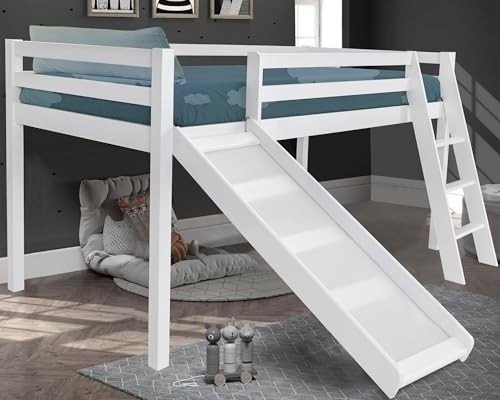Bunk Beds Sale: A Comprehensive Guide to Choosing the Right Bunk Bed for Your Home
Bunk beds have actually long been a staple in children's bed rooms, providing a mix of space-saving performance and enjoyable. Whether accommodating brother or sisters, buddies on sleepovers, or just optimizing a playroom, bunk beds have become an important component in contemporary household homes. As sales on bunk beds rise, it becomes increasingly crucial for customers to make informed choices when purchasing one. This article will cover the essentials of acquiring a bunk bed, from types to safety features, along with tips for keeping the integrity of your investment.
Types of Bunk Beds
When thinking about a bunk bed sale, it's essential to understand the various designs offered on the marketplace. Below are the most typical types:
- Traditional Bunk Beds: These include two beds stacked one above the other, sharing a single frame. They are frequently the most economical alternative.
- L-Shaped Bunk Beds: This design includes one bed positioned vertically and another horizontally. This plan develops extra space below the upper bed, which can be used for storage or a play location.
- Lofted Beds: Similar to conventional bunk beds however with no lower bed. Instead, top article underneath can be made use of for a desk, play area, or additional storage.
- Triple Bunk Beds: For families with a bigger number of kids or regular slumber parties, triple bunk beds supply three sleeping locations in a space-efficient design.
- Futon Bunk Beds: These styles merge bunk beds and futon couches. The bottom section converts into a different seating area, boosting functionality.
- Convertible Bunk Beds: These beds can be separated into 2 individual beds, making them flexible as kids's requirements change with time.
Table 1: Comparison of Bunk Bed Types
| Type | Description | Space Efficiency | Additional Features |
|---|---|---|---|
| Standard Bunk Bed | Two beds stacked vertically | High | Simplest design |
| L-Shaped Bunk Bed | One vertical and one horizontal bed | Moderate | Play or storage space |
| Lofted Bed | Elevated bed with open space listed below | High | Work/play area |
| Triple Bunk Bed | Three stacked beds | Extremely High | Accommodates more users |
| Futon Bunk Bed | Bunk bed with a convertible futon | High | Multi-functional |
| Convertible Bunk Bed | Can be divided into two separate beds | Moderate | Versatility & & longevity |
Safety Features to Consider
Security is vital when purchasing a bunk bed. Below are crucial safety functions to search for:
- Guardrails: Adequate guardrails must exist on both sides of the upper bunk to avoid falls. They need to be at least 5 inches higher than the mattress.
- Ladder Design: Look for tough, wide ladders with slip-resistant rungs. Make sure that the angle is not too high for easy gain access to.
- Stability: Ensure the bed is built with strong products, such as solid wood or durable metal. The bed should not wobble when in use.
- Weight Limit: Check the weight capability of the bunk bed to ensure it can accommodate the intended users securely.
- Product Safety: If possible, select beds made from non-toxic materials or those fulfilling safety standards for kids's furniture.
Table 2: Essential Safety Features
| Function | Description | Importance |
|---|---|---|
| Guardrails | Sides of upper bed to prevent falls | Important for child security |
| Ladder Design | Strong, slip-resistant rungs | Aids safe and simple gain access to |
| Stability | Build quality to avoid wobbling | Makes sure safety and longevity |
| Weight Limit | Optimum weight capability | Avoids accidents |
| Product Safety | Non-toxic, safe materials | Protects kids's health |
Maintenance Tips for Bunk Beds
To extend the life of your bunk bed and ensure ongoing security, consider the following upkeep suggestions:
- Regular Inspections: Periodically examine the structure for loose screws, bolts, or any indications of wear. Tighten up fasteners as needed.
- Tidy Periodically: Dust and clean the surface areas routinely. Use proper cleaners that won't harm the surface.
- Inspect Weight Limits: Be conscious of weight limits, especially with older children or adults who might want to utilize the upper bunk.
- Avoid Climbing on Guardrails: Educate children not to use guardrails for climbing or playing to decrease the risk of mishaps.
Often Asked Questions (FAQs)
Q1: What is the age limitation for children to safely use bunk beds?A: While it differs by the manufacturer, many suggest that kids under six ought to not sleep in the upper bunk due to security concerns.
Q2: How can parents dissuade risky climbing?A: Setting clear guidelines about bunk bed use and monitoring children can assist. In addition, using a bed camping tent can discourage climbing while creating a fun sleep environment.
Q3: What should I consider when embellishing a room with bunk beds?A: Ensure there is enough space around the bunk bed for safe motion, and utilize the decor to create personalized spaces for each kid.
Q4: Is a lofted bed ideal for older children?A: Yes, lofted beds can be ideal for older children as long as they meet security requirements and the kid is responsible enough to use them safely.
Bunk beds serve a functional purpose while including an aspect of enjoyable to a child's bedroom. As sales of bunk beds continue to rise, cautious factor to consider of types, safety features, and upkeep practices is essential for moms and dads and caretakers. By comprehending these important factors, households can discover the perfect bunk bed for their home, making sure both practicality and security for many years to come. Whether it's for siblings sharing a room or producing a cozy slumber party space, a well-chosen bunk bed can provide pleasure and usefulness, making it a worthy financial investment.

